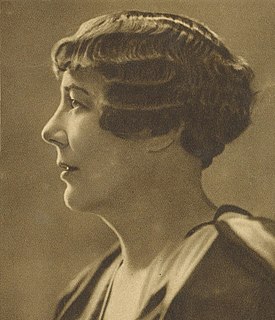
Zofia Kossak-Szczucka was a Polish writer and World War II resistance fighter. She co-founded two wartime Polish organizations: Front Odrodzenia Polski and Żegota, set up to assist Polish Jews to escape the Holocaust. In 1943, she was arrested by the Germans and sent to Auschwitz Concentration Camp, but survived the war.

Żegota was the Polish Council to Aid Jews with the Government Delegation for Poland, an underground Polish resistance organization, and part of the Polish Underground State, active 1942–45 in German-occupied Poland. It was the successor to the Provisional Committee to Aid Jews.

Irena Stanisława Sendler (née Krzyżanowska), also referred to as Irena Sendlerowa in Poland, nom de guerre "Jolanta", was a Polish humanitarian, social worker, and nurse who served in the Polish Underground Resistance during World War II in German-occupied Warsaw. From October 1943 she was head of the children's section of Żegota, the Polish Council to Aid Jews.

The Kraków Ghetto was one of five major metropolitan Jewish Ghettos created by Nazi Germany in the new General Government territory during the German occupation of Poland in World War II. It was established for the purpose of exploitation, terror, and persecution of local Polish Jews, as well as the staging area for separating the "able workers" from those who would later be deemed unworthy of life. The Ghetto was liquidated between June 1942 and March 1943, with most of its inhabitants sent to their deaths at Bełżec extermination camp as well as Płaszów slave-labor camp, and Auschwitz concentration camp, 60 kilometres (37 mi) rail distance.
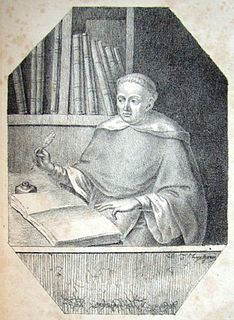
Szymon Okolski (1580–1653), also known as Simon Okolski, was a well-known Polish–Lithuanian historian, theologian, and specialist in heraldry. His own clan and coat of arms were that of Rawicz. He was born in Kamieniec Podolski, died in Lviv. He headed chairs of theology in Lviv and Bologna. A member of the Dominican Order, in 1641 he became a superior of the Dominican monastery in Kamieniec Podolski. In 1648 Okolski accepted the post of the prowincjał of the Dominican Order in the Polish–Lithuanian Commonwealth-controlled Ruś territories. The center of the province was located in Lwow.
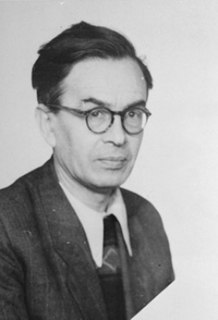
Henryk Woliński (1901–1986) was a member of the Polish resistance movement in World War II, specifically the Armia Krajowa (AK), where he reached the rank of colonel. He was the head of the "Jewish Department" in AK's Bureau of Information and Propaganda. His codename was "Wacław". He was recognized by Yad Vashem as one of the Righteous among the Nations. He himself harbored in his apartment over 25 Jews for a period going from a few days to several weeks.
Irene Tomaszewski is a Canadian writer, editor and translator of Polish descent living in Montreal, Canada.
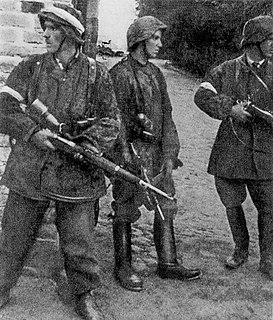
The Provisional Committee to Aid Jews was founded on September 27, 1942, by Zofia Kossak-Szczucka and Wanda Krahelska-Filipowicz. The founding body consisted of Polish democratic Catholic activists associated with the Front Odrodzenia Polski, Polska Organizacja Demokratyczna, Związek Syndykalistów Polskich and PPS-WRN. It was the direct predecessor to Żegota, the underground Council to Aid Jews.
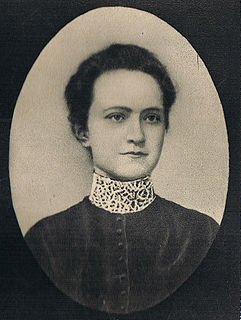
Wanda Krahelska-Filipowicz, code name “Alinka”” or “Alicja”, was a leading figure in Warsaw’s underground resistance movement throughout the years of German occupation during World War II in Poland, co-founder of Żegota. As the well-connected wife of a former ambassador to Washington, she used her contacts with both the military and political leadership of the Polish Underground to materially influence the underground's policy of aiding Poland's Jewish population during the war.
The Polish Rifle Squads was a Polish pro-independence paramilitary organization, founded in 1911 by the Youth Independence Organization Zarzewie in the Austro-Hungarian sector of partitioned Poland. Among its founders were Norwid Neugebauer, Marian Januszajtis-Żegota, Henryk Bagiński and Eugeniusz Homer.
The Polish Coup of early January 1919 was an unsuccessful coup d'etat in Poland. On 4–5 January 1919, right-wing National Democrats attempted to overthrow the government of Jędrzej Moraczewski and Józef Piłsudski. The coup's leaders included Marian Januszajtis-Żegota and Prince Eustachy Sapieha.
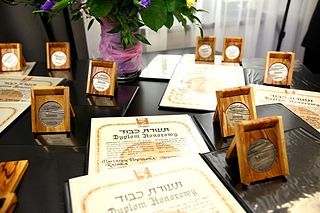
The citizens of Poland have the world's highest count of individuals who have been recognized by Yad Vashem of Jerusalem as the Polish Righteous Among the Nations, for saving Jews from extermination during the Holocaust in World War II. As of 1 January 2019, there are 6,992 Polish men and women recognized as Righteous Among the Nations, over a quarter of the 27,362 recognized by Yad Vashem in total. Many of these initiatives were carried out by individuals, but there also existed organized networks of Polish resistance which were dedicated to aiding Jews – most notably, the Żegota organization.

Julian Grobelny was an activist in the Polish Socialist Party (PPS) from 1915, in the lead-up to Poland's return to independence. During the interwar period he was a social activist. After the German-Soviet invasion of Poland in 1939, and the ensuing Holocaust, he became President of Żegota active in the General Government territory of occupied Poland. The clandestine organization was named after a fictional character Konrad Żegota born on the exact day of its inception in 1942. Grobelny served as president of Żegota until the end of hostilities.
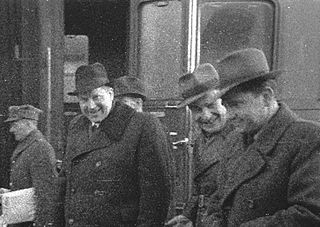
Ferdynand Marek Arczyński, cryptonym "Marek" or "Lukowski", was one of the founding members of an underground organization Żegota in German-occupied Poland, from 1942 to 1945. Żegota's express purpose was to help the country's Jews survive the Holocaust; find places of safety for them, and provide relief payments to thousands of families. Poland was the only country in occupied Europe with such an organization during World War II.
Ostatnia brygada is a 1938 Polish film directed by Michał Waszyński. The film's art direction is by Jacek Rotmil.

Polish Jews were among the primary victims of the German-organized Holocaust. Throughout the German occupation of Poland, many Poles rescued Jews from the Holocaust, in the process risking their lives – and the lives of their families. Poles were, by nationality, the most numerous persons who rescued Jews during the Holocaust. To date, 6,992 ethnic Poles have been recognized by the State of Israel as Righteous among the Nations – more, by far, than the citizens of any other country.
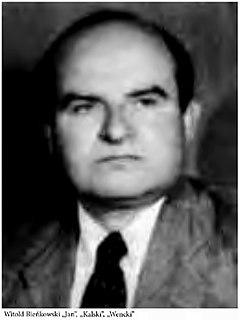
Witold Bieńkowski, code-name Wencki (1906–1965), was a Polish politician, publicist and leader of the Catholic underground organization called Front for a Reborn Poland during World War II, as well as member of the Provisional Committee to Aid Jews, Żegota, and a permanent representative of the Delegation for Poland of the Polish Government-in-Exile.

Teresa Prekerowa, also Teresa Preker née Dobrska was a Polish historian and author of Konspiracyjna Rada Pomocy Żydom w Warszawie 1942-1945 published in 1982 during the communist military crackdown in the Polish People's Republic.

Front for the Rebirth of Poland also translated as the Front for a Reborn Poland was a clandestine anti-Fascist organization formed in 1941 in occupied Poland during World War II, by a group of secular Catholics of Warsaw led by Zofia Kossak-Szczucka and Father Edmund Krauze. The Front upheld Christian ideals of the prewar Catholic Action movements existing in the Polish Second Republic as part of the cross national European groupings of lay Catholics.
Zofia Rudnicka(1907 - February 7, 1981 in Warsaw) - Polish lawyer and judge, social activist, member of the Council for Aid to Jews at the Government Delegation for the Country "Żegota". After the war, she worked in the judiciary, for twenty years she was the chairman of the Civil and Audit Department of the Provincial Court for the Capital City of Warsaw.














